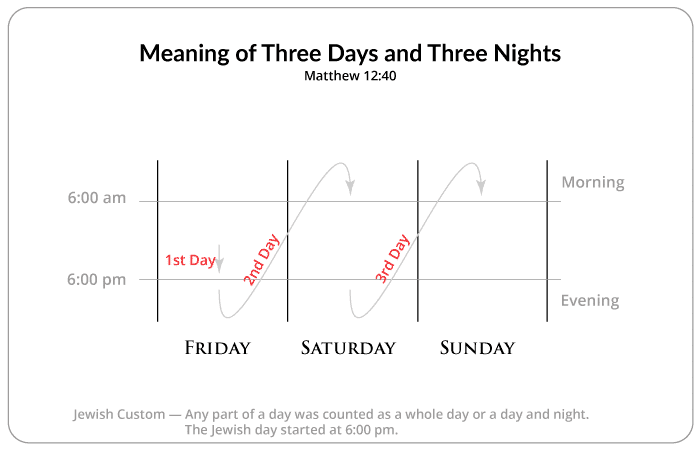sigamos refierendo fuentes , no apto para nenes que ni siquiera sepan contar hasta tres ni para trolls que solo entrar a estorbar:
Bible Question:
What is the meaning of three days and three nights in the Bible?
Bible Answer:
What is the
meaning of three days and three nights in the Bible? That question is often asked because people assume the expression “three days and three nights” refers to three full days or seventy-two hours. Then they struggle with the fact that Jesus died on Friday afternoon and was buried, was in the grave on Saturday, and was in the grave and arose on Sunday morning. They struggle because that is not a seventy-two hour period. It is not three full days and three full nights. Therefore, some people try to find proof that Jesus died on Thursday. Others conclude the Bible is wrong.
The root cause of this confusion is that they do not understand the meaning of the old Jewish expression “three days and three nights” that occurs in the Bible.
Meaning of Three Days and Three Nights
The Bible was written by Jewish authors who used Jewish expressions. The meaning of three days and three nights in the Bible can refer to
a span of time that starts on one day and ends sometime on the third day. The reason is that the Jews counted any part of a day as a full day. For example,
the Jerusalem Talmud states,
[Rabbi] Akiba fixed a day for an Onah, and a night for an Onah: but the tradition is, that Rabbi Eliezar Ben Azariah said, . . .”A day and a night make an Onah, and a part of an Onah is as the whole.” . . . [Rabbi] Ismael computeth a part of the Onah for the whole.[4]
Rabbi Akiba said a day and a night make an Onah. But an Onah can also be only part of a day and a night. The term Onah refers to a full day or twenty-four hours in this statement. That gives us the definition of three days and three nights in the Bible.
This also helps us
understand that from a Jewish perspective, Jesus was dead for three Onah or three days and three nights in the Bible. Why? When Christ died and was buried on Friday, the Jews counted that as the first day or a day and a night. When Jesus was in the grave from Friday night at 6:00 pm until Saturday at 5:59 pm, it is clear that He was in the grave a second day or an additional day and a night. Notice the Jewish day was from 6:00 pm to 6:00 pm. Since Christ was in the grave on Saturday at 6:00 pm until Sunday morning before His resurrection, that is counted as the third day or another morning and evening. This helps us understand Jesus was in the grave for three days and three nights according to the Bible.
Conclusion:
The expression, three days and three nights, as used in the Bible refers to a period of time that begins at some point during the first day and ends sometime in the third day. The examples above illustrate this definition.
References:
1. Babylonian Talmud. Abodah Zarah 5:11.
Examples from the Bible and Jewish culture are given that explain the meaning of three days and three nights in the Bible.

www.neverthirsty.org
vamos... que mejor les creemos a los expertos del foro



